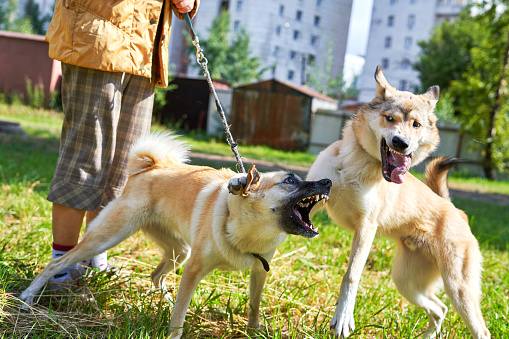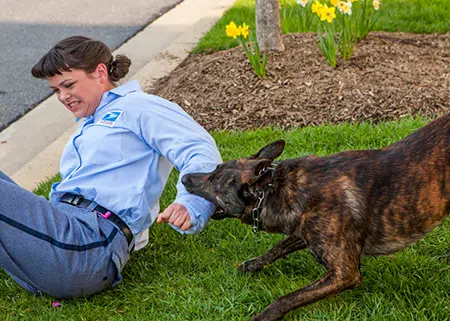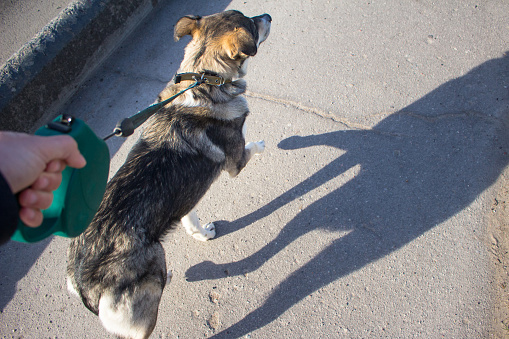Getting bitten by a dog is a terrifying experience. In the aftermath of the shock and pain, you might be worried about rabies, infections, or even future scarring.
Here in Ohio, the Department of Health plays a major role in dog bites, and understanding what they do can ease some of your anxiety. Let’s explore how they can be a resource for you during this stressful time.
If you have just been bitten by a dog, your first priority should be to seek medical attention immediately. Even if the bite looks minor, a doctor can check for hidden damage and make sure you don’t get any nasty infections, including rabies. Only once you’ve been taken care of should you start thinking about these next steps.
What Does the Ohio Department of Health Do After a Dog Bite?
Getting bitten by a dog can be a frightening experience, but here in Ohio, you’re not alone. The Ohio Department of Health has a responsibility in these situations to ensure public health safety and support you through the healing process.
Rabies testing and monitoring
One of the biggest worries after a dog bite is rabies. Although cases are rarely seen in the United States, it’s not something to be taken lightly—Ohio’s local health departments investigate an average of 20,000 animal bite and exposure incidents for rabies every year.
The Ohio Department of Health will work with local officials to conduct a rabies risk assessment, where they’ll ask questions such as:
- Was the dog vaccinated against rabies?
- Was there a bite or saliva exposure to broken skin or mucous membranes?
- Is the animal available for 10 days of observation or rabies testing?
- Is the bite to the face or head of a young child?
If the answers to these questions make it appear as though rabies is a possibility, you’ll need to begin rabies treatment. This might seem scary, but it’s a precaution to keep everyone safe; rabies is almost always fatal.
Public health investigations
Next, the health department will work with other authorities to conduct an investigation to gather more information about the incident. This may include interviews with the victim, the dog owner, and witnesses.
The investigation helps to determine if there are broader public health risks and whether additional measures, such as community notifications or more extensive quarantines, are necessary.
How to Report a Dog Bite to the Ohio Department of Health
Step 1: Seek immediate medical attention
Before doing anything else, prioritize getting medical attention. Nobody wants to face permanent scarring or complications from an untreated wound, and prompt medical care can prevent long-term damage.
Healthcare providers are required to report dog bites to the local health department to ensure there’s a clear record of the incident and that all the necessary medical and legal steps are followed to a tee.
Step 2: Gather necessary information
Collect all relevant information about the dog bite, including:
- Description of the biting animal (e.g., breed, size, color)
- Name of the owner (if known)
- Date, time, and location of the bite
- Circumstances of the bite or attack
- Contact information for any witnesses
- Rabies vaccination status of the animal (if known)
- Photos of injuries and the location where the incident occurred (if safely possible)
Step 3: Contact your local dog warden
When reporting a dog bite in Ohio, your first point of contact should be your local dog warden or animal control agency, not directly to the Ohio Department of Health. These local authorities are responsible for filing the appropriate reports with the Ohio Department of Health as part of their protocol.
Need help contacting your local dog warden? Call Slater & Zurz at 330-762-0700—we have a list of all local agencies, including police, dog wardens, and health departments.
Step 4: Contact your local health department
If the dog warden or local animal control cannot be reached, or if you feel that the response is inadequate—especially if there is an immediate public health risk involved—then you should follow these steps to contact the Ohio Department of Health directly.
Here’s a list of contact information for Ohio’s major cities’ health departments:
- Akron, Ohio Health Department (Summit County): (330) 926-5600
- Columbus, Ohio Health Department (Franklin County): (614) 525-3160
- Cleveland, Ohio Health Department: (216) 664-3747
- Canton, Ohio Health Department (Stark County): fill out this form
- Toledo, Ohio Health Department (Toledo-Lucas County): (419) 213-4100
- Cincinnati, Ohio Health Department (Hamilton County): (513) 946-7800
If your area isn’t included in this list, give us a call at 330-762-0700 to get your local health department’s contact information.
What Else Do You Need to Do After a Dog Bite?
Document everything
In the aftermath of a dog bite, thorough documentation is your strongest ally. Take photographs of your injuries immediately after the bite and throughout the healing process.
And remember: don’t throw away any medical records and receipts for medication or treatments like physical therapy—these documents are essential for insurance claims and any potential lawsuits.
File a police report
Here’s why filing a police report can be helpful:
- Creates a record. A police report serves as an official record of the incident, which can be important evidence if you ever need to take legal action.
- Monitors the dog. By reporting the attack, you can help alert authorities to keep an eye on the dog and potentially prevent future bites.
- Protects others. The more information authorities have about aggressive dogs, the better equipped they are to keep everyone safe. Ohio has dangerous dog laws, where dogs who’ve caused injury in the past have to follow certain legal requirements.
Filing a report may feel like an unnecessary escalation—especially if you know the dog’s owner—but trust me, it can bring you peace of mind knowing the situation is documented and that steps might be taken to prevent future incidents.
Reach out to a dog bite lawyer
We know that navigating the legal aftermath of a dog bite can be as stressful as the incident itself. Nobody wants to sue a friend, family member, or neighbor, and here’s the good news: usually, you don’t have to.
Dog bite claims are often settled outside of court, typically through the dog owner’s homeowner’s insurance. This means you get the compensation you deserve for your medical fees while avoiding the stress of a lawsuit.
That said, you’ll need to carefully document the incident and gather all necessary evidence to ensure you have a sound claim. If these steps sound too overwhelming right now, our dog bite team at Slater & Zurz is here to help—for free. Call us at 330-762-0700 for a free consultation, and if you decide to file a claim against the dog owner, pay nothing until we win compensation for you.
Frequently Asked Questions
- What happens when a doctor reports a dog bite?
- When a doctor reports a dog bite, the information is forwarded to the local health department. This triggers an investigation into the incident, including checking the dog’s vaccination status, and may lead to preventive measures such as quarantine for the dog to monitor for signs of rabies.
- How do I contact the health department in Akron, Ohio?
- You can contact the health department in Akron, Ohio, by calling (330) 926-5600.





